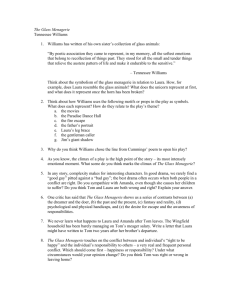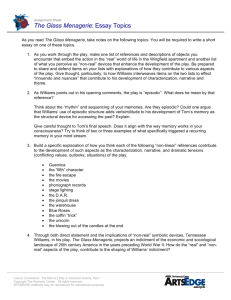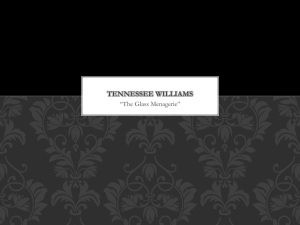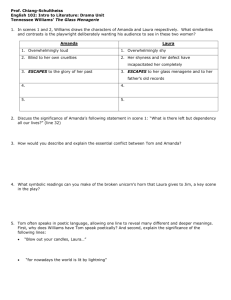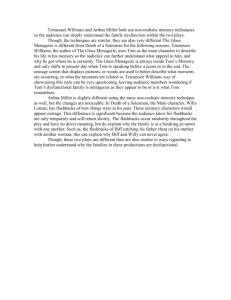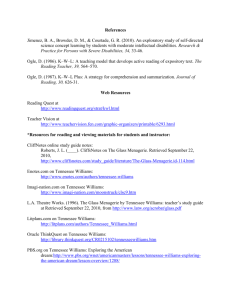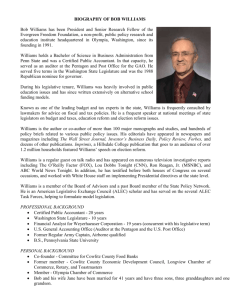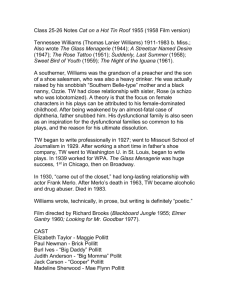Author Bio/Background & Historical Context/Tricky Terms
advertisement
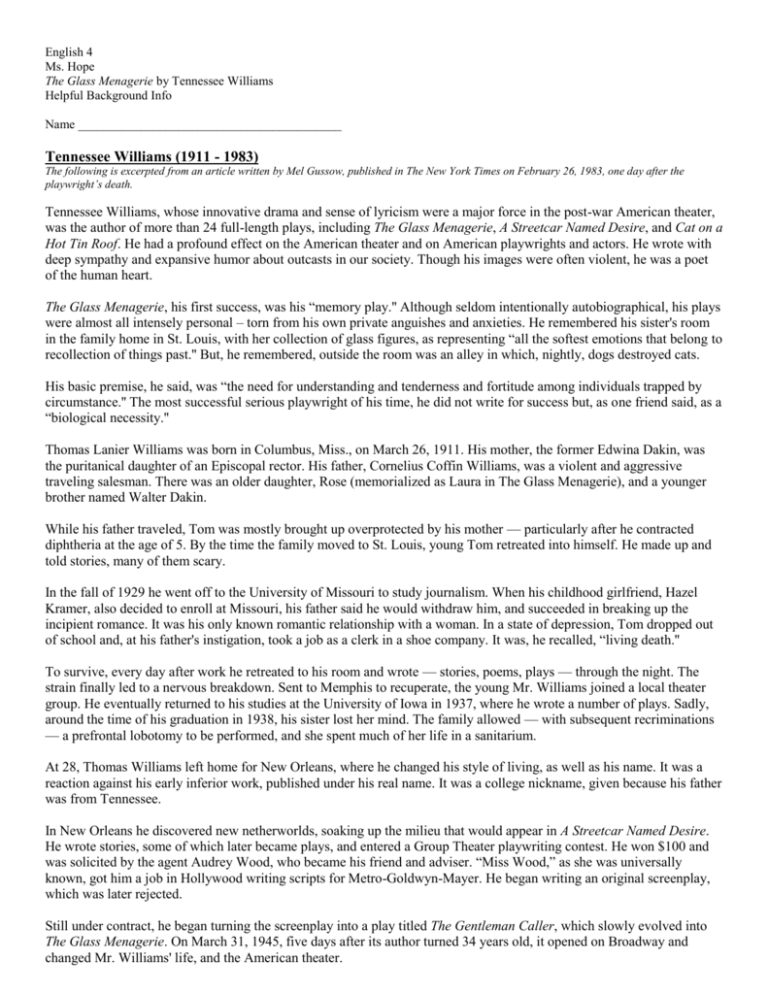
English 4 Ms. Hope The Glass Menagerie by Tennessee Williams Helpful Background Info Name __________________________________________ Tennessee Williams (1911 - 1983) The following is excerpted from an article written by Mel Gussow, published in The New York Times on February 26, 1983, one day after the playwright’s death. Tennessee Williams, whose innovative drama and sense of lyricism were a major force in the post-war American theater, was the author of more than 24 full-length plays, including The Glass Menagerie, A Streetcar Named Desire, and Cat on a Hot Tin Roof. He had a profound effect on the American theater and on American playwrights and actors. He wrote with deep sympathy and expansive humor about outcasts in our society. Though his images were often violent, he was a poet of the human heart. The Glass Menagerie, his first success, was his “memory play.'' Although seldom intentionally autobiographical, his plays were almost all intensely personal – torn from his own private anguishes and anxieties. He remembered his sister's room in the family home in St. Louis, with her collection of glass figures, as representing “all the softest emotions that belong to recollection of things past.'' But, he remembered, outside the room was an alley in which, nightly, dogs destroyed cats. His basic premise, he said, was “the need for understanding and tenderness and fortitude among individuals trapped by circumstance.'' The most successful serious playwright of his time, he did not write for success but, as one friend said, as a “biological necessity.'' Thomas Lanier Williams was born in Columbus, Miss., on March 26, 1911. His mother, the former Edwina Dakin, was the puritanical daughter of an Episcopal rector. His father, Cornelius Coffin Williams, was a violent and aggressive traveling salesman. There was an older daughter, Rose (memorialized as Laura in The Glass Menagerie), and a younger brother named Walter Dakin. While his father traveled, Tom was mostly brought up overprotected by his mother — particularly after he contracted diphtheria at the age of 5. By the time the family moved to St. Louis, young Tom retreated into himself. He made up and told stories, many of them scary. In the fall of 1929 he went off to the University of Missouri to study journalism. When his childhood girlfriend, Hazel Kramer, also decided to enroll at Missouri, his father said he would withdraw him, and succeeded in breaking up the incipient romance. It was his only known romantic relationship with a woman. In a state of depression, Tom dropped out of school and, at his father's instigation, took a job as a clerk in a shoe company. It was, he recalled, “living death.'' To survive, every day after work he retreated to his room and wrote — stories, poems, plays — through the night. The strain finally led to a nervous breakdown. Sent to Memphis to recuperate, the young Mr. Williams joined a local theater group. He eventually returned to his studies at the University of Iowa in 1937, where he wrote a number of plays. Sadly, around the time of his graduation in 1938, his sister lost her mind. The family allowed — with subsequent recriminations — a prefrontal lobotomy to be performed, and she spent much of her life in a sanitarium. At 28, Thomas Williams left home for New Orleans, where he changed his style of living, as well as his name. It was a reaction against his early inferior work, published under his real name. It was a college nickname, given because his father was from Tennessee. In New Orleans he discovered new netherworlds, soaking up the milieu that would appear in A Streetcar Named Desire. He wrote stories, some of which later became plays, and entered a Group Theater playwriting contest. He won $100 and was solicited by the agent Audrey Wood, who became his friend and adviser. “Miss Wood,” as she was universally known, got him a job in Hollywood writing scripts for Metro-Goldwyn-Mayer. He began writing an original screenplay, which was later rejected. Still under contract, he began turning the screenplay into a play titled The Gentleman Caller, which slowly evolved into The Glass Menagerie. On March 31, 1945, five days after its author turned 34 years old, it opened on Broadway and changed Mr. Williams' life, and the American theater. A Little Background/Context The play begins with the entrance of the character, Tom. In Tom’s first lines as he enters the stage, Williams provides even more instruction for future directors to follow when producing the play. Tom describes the sound and lighting of the play leaving no doubt in a director’s mind as to what the play should look and sound like: “The play is memory. Being a memory play, it is dimly lighted, it is sentimental, it is not realistic. In memory everything seems to happen to music. That explains the fiddle in the wings.” Williams seems intent to ensure that the audience understands what he was up to when he created each character. Tom explains each and emphasizes the symbolism of their presence in the story: “I am the narrator of the play, and also a character in it. The other characters in the play are my mother, Amanda, my sister, Laura, and a gentleman caller who appears in the final scenes. He is the most realistic character in the play, being an emissary from a world of reality that we were somehow set apart from. But having a poet’s weakness for symbols, I am using this character as a symbol; he is the long-delayed but always expected something that we live for. The fifth character in the play doesn’t appear except in a larger than life-size photograph hanging on the wall. When you see the picture of this grinning gentleman, please remember this is our father who left us a long time ago.” Williams sets the play during a particular historical period and Tom’s character explains not only the time but the significance of the time and the mood of the period: “To begin with I turn back time. I reverse it to that quaint period, the thirties, when the huge middle class of America was matriculating in a school for the blind. Their eyes had failed them, or they had failed their eyes, and so they were having their fingers pressed forcibly down on the fiery Braille alphabet of a dissolving economy. In Spain there was a revolution. Here there was only shouting and confusion. In Spain there was Guernica. Here there were disturbances of labor, sometimes pretty violent, in otherwise peaceful cities such as Cleveland – Chicago – St. Louis... This is the social background of the play.” The play is based on a short story that Williams had written as a sort of homage to his sister, Rose. He was quite devoted to her and her troubled existence weighed heavily on him. She had psychological problems that were not well understood at the time and she ended up having a lobotomy, which left her to live a life with the mental capacity of a child. Williams was devastated by this and used his writing as a way to deal with his grief. The short story ultimately became The Glass Menagerie and its production made Williams a famous and wealthy man. While the story is not truly autobiographical, it does draw on much of the author’s experience and so it makes sense that he would want to control how the play would be presented. And the character of Tom, who is understood to be Williams (whose real first name was Tom), deals with the pain of his inability to help his sister. In the closing lines as he describes his inability to forget her eyes and her face, he expresses his turmoil: “Oh, Laura, Laura, I tried to leave you behind me, but I am more faithful than I intended to be! ...I buy a drink, I speak to the nearest stranger- anything that can blow your candles out! ...Blow out your candles, Laura...” Words to Know The Glass Menagerie contains numerous words and phrases that may be unfamiliar or strange. You may want to take a few minutes to familiarize yourself with these terms before reading and/or watching this play. Guernica – Artist Pablo Picasso was inspired to create a massive painting that evoked the horrors of war. He named it after the town in which thousands of innocent people were killed in a bombing on April 26, 1937 during the Spanish Civil War. Gentleman Caller – Boyfriend; Young man interested in dating a young woman. In the Old South a young man would be expected to visit a girl at her home where she might entertain a group of young people. Outright dating at the time was not acceptable so young people gathered at their homes and flirted and enjoyed each other’s company in the presence of chaperones. Mastication – Chewing The Colored Boy – In the old south many white families had servants (this was after the end of the Civil War so these servants were paid laborers but were still considered of a lower class) and it was common to refer to them in this way. Today referring to a person in such a demeaning way is considered very offensive. Business College – School for students to train for secretarial work. Typing, stenography, and other tasks needed for office work are the usual courses offered in this type of school. In the 1930s many women were joining the work force and gained valuable skills at such schools. Victrola – An early type of record player that was wound with a crank to operate the turntable Menagerie – A display of animals, mostly wild or exotic Spinster – An unmarried woman. Another term often used is “old maid.” Both terms can be derogatory because the expectation in the early part of the 20th century was that a woman had not fulfilled her destiny if she was not married and raising a family. Pirates of Penzance – One of many comic, light operas written by Gilbert and Sullivan Pleurosis – An inflammation of the lungs Mr. Lawrence (“that hideous book”) – D.H. Lawrence was a famous (some would have said, infamous) writer whose books were known for their overt depictions of sexuality – a taboo subject during the early part of the twentieth century. One of his most famous books, published in 1928, was Lady Chatterley’s Lover. Many women professed horror at his books but they were widely read although, perhaps, in secret. Sixty-Five dollars a month – A low, but not unusually so, salary during the 1930s. The average salary at the time was about $1,500 so it would be a salary typical of someone fresh out of school – an entry level position. Cathouse – House of ill-repute (lacking morals) Garbo picture – Movie starring famed actress, Greta Garbo, whose movies were adored by the public. She was considered one of the great beauties of the time. The Movies – In the 1930s a person could spend quite a bit of time in a movie theatre watching not just the movie itself, but Travelogues (short documentaries of fascinating places around the world); Newsreels (films that updated the public about current events – these were the days before television – and showed scenes of war, human interest stories, new products and inventions, etc.); and Organ Solos (at the time of silent movies theatres had an organist who would provide the soundtrack for the films. Once films had sound the organs were still in place in the theatres and for some years they continued to be played before and/or after the feature film); and vaudeville acts such as singers, dancers, comedians and magicians. Fire escape – Tenement style houses and apartment buildings in cities have metal fire escapes that allow inhabitants to get out of the house quickly in the event of fire. Often people use these as a place to get outside without having to go all the way downstairs. For some, it is as close to a porch as they can get and they use it as such even though the landing is usually quite small. Merchant Marine – “The Merchant Marine is the fleet of ships which carries imports and exports during peacetime and becomes a naval auxiliary during wartime to deliver troops and war materiel. The Government trained the men to operate the ships and assist in manning the guns through the U.S. Maritime Service.” Members of the Merchant Marine are referred to as mariners, seamen, seafarers, sailors. They are not Marines. “When training ended the person was "released from active duty" in the Maritime Service and went to sea in the Merchant Marine. Berchtesgaden – A beautiful area in Germany that was used by the Nazis for their officers’ pleasure. Hitler had a home there. Chamberlain – Neville Chamberlain was British Prime Minister from 1937 to 1940. He is remembered, among other things, for his signing of the Munich Agreement in 1938 giving part of Czechoslovakia to the Nazis. Cretonne – A printed cotton fabric usually used for upholstery, drapery, etc. Jonquils – A yellow flower similar to a daffodil. Cake-walk – A light-hearted dance competition or musical chairs type game played in the late 1800s or early 1900s often in the southern states. Sweets or small cakes were offered as prizes to the winners. Cotillion – A formal dance occasion Malaria fever – A mosquito-borne disease that causes fever, weakness and sometimes death. It was often treated with quinine, a fever reducing drug. Dizzy Dean – Popular baseball player of the 1930s known for bragging about his abilities although one of his most famous quotes was, “It ain’t braggin’ if you can do it.” Southern behavior – Stereotypical idea of people from the south having particularly good manners. Southern people are often seen as more “genteel” than people from other parts of the country and some are proud of this reputation. Domestic – Having skills (cooking, cleaning, sewing) that make one a good homemaker Sons of planters – In the south, a “planter” was someone who owned a significant amount of property and wealth. Sons of planters inherited that wealth. Mr. Edison’s Mazda lamp – Early light bulb standard (around 1909) for bulbs with a tungsten filament…an improvement over other bulbs of the era Dandelion wine – Wine, often associated with southern states and summer months, made from the flowers of the dandelion Century of Progress – A major exhibit in the 1933-34 Chicago Exposition (World’s Fair), the exhibit was intended to highlight the century 1833-1933 but came to represent the modern world. The exhibit was wildly popular and helped create a feeling of hope for the future during the Great Depression. Future of television – Television, in the 1930s, was an interesting concept but its possibilities were only beginning to be realized. Dance “program” – In past centuries, a young lady attending a ball or dance would have a dance card or “program”. Gentlemen would ask to be included on her program and their names would be listed so that they could have a dance with the lady when it was their turn. Obviously, a young woman wanted as many names as possible on her program so that she would appear popular and so that she might meet eligible young men among whom she might find a prospective husband. Stumblejohn – Clumsy or foolish person Gay – Cheerful or happy. Jalopy – Car
